

Psychology AS: The Complete Companion - Mike Cardwell, Cara Flanagan. Psychology AS: The Complete Companion - Mike Cardwell, Cara Flanagan. Psychology: Complete Study and Revision Guide - Cara Flanagan. Evaluation of Bowlby’s Maternal Deprivation Theory. Bowlby was a psychologist who founded a very influential theory about child attachment, this is often known as the maternal deprivation theory (Bowlby, 1951).
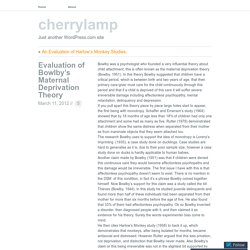
In this theory Bowlby suggested that children have a critical period, which is between birth and two years of age, that their primary care-giver must care for the child continuously through this period and that if a child is deprived of this care it will suffer severe irreversible damage including affectionless psychopathy, mental retardation, delinquency and depression. If you pull apart this theory piece by piece large holes start to appear, the first being with monotropy. Schaffer and Emerson’s study (1964) showed that by 18 months of age less than 18% of children had only one attachment and some had as many as five. Rutter (1979) demonstrated that children show the same distress when separated from their mother as from inanimate objects that they seem attached too. References Bowlby, J. (1944). Bowlby, J. (1951). AQA Psychology: AS and A-level Year 1 - Michael Eysenck. AQA Psychology for AS and A-level Year 1 is the definitive textbook for the new 2015 curriculum.
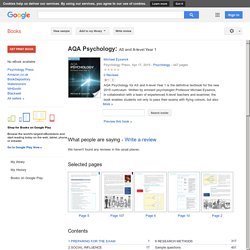
Written by eminent psychologist Professor Michael Eysenck, in collaboration with a team of experienced A-level teachers and examiner, the book enables students not only to pass their exams with flying colours, but also to fully engage with the science of psychology. As well as covering the six core topics students will study, the book includes: Activities which test concepts or hypothesises, bringing theory to life. Incorporating greater coverage of research methods, as well as key statistical techniques, the sixth edition of this well-loved textbook continues to be the perfect introduction to psychology.
Accessible yet rigorous, the book is the ideal textbook for students taking either the AS course or year 1 of the A-level. Psychology for AS Level - Michael W. Eysenck. Now in full colour, this thoroughly revised and updated 3rd edition of Psychology for AS Level takes into account all the latest changes to the AQA-A syllabus since the last edition was published.
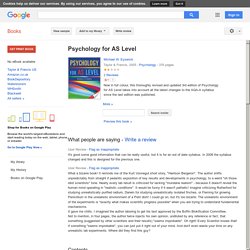
It remains closely mapped to the specification making it ideal for students taking the AS Level Psychology exam. New to this edition is a strong emphasis on exam technique, giving students the best chance possible of the highest grades. A whole chapter is devoted to how to study and how to pass, with an 'Examiner's Viewpoint' written by the Chief Examiner at AQA-A. Throughout the book are hints and tips on picking up marks, and there are constant page references to the summarised content in our companion AS revision guide. Further examination support is provided by our accompanying student website, AS Online, available on a subscription basis to all schools and sixth form colleges that adopt the text. Ages & Stages: How Children Develop Self-Concept.
Stage by Stage 0 - 2 Babies need loving and consistent relationships to develop a positive sense of self.
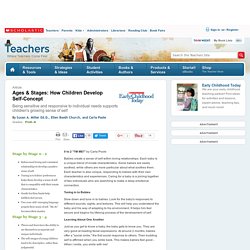
Tuning in to babies' preferences helps them develop a sense of self that is compatible with their innate characteristics. Gentle but firm limits help toddlers feel secure. Self-regulation in Early Childhood: Nature and Nurture - Martha Bronson. BTEC First Early Years - Sandy Green. Teaching English Language Learners: Literacy Strategies and Resources for K-6 - Shelley Hong Xu.
Sociology As: The Complete Companion - Jonathan Blundell, Patrick McNeill, Janis Griffiths. Advanced Sociology Through Diagrams - Tony Lawson, Marsha Jones, Ruth Moores. Introduction To Sociology : 06 Socialization. How Do We Become Human?
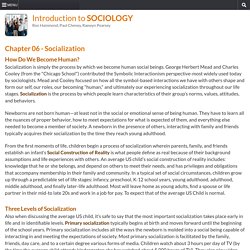
Socialization is simply the process by which we become human social beings. George Herbert Mead and Charles Cooley (from the "Chicago School") contributed the Symbolic Interactionism perspective-most widely used today by sociologists. Mead and Cooley focused on how all the symbol-based interactions we have with others shape and form our self, our roles, our becoming "human," and ultimately our experiencing socialization throughout our life stages. Socialization is the process by which people learn characteristics of their group’s norms, values, attitudes, and behaviors. Newborns are not born human—at least not in the social or emotional sense of being human. From the first moments of life, children begin a process of socialization wherein parents, family, and friends establish an infant’s Social Construction of Reality is what people define as real because of their background assumptions and life experiences with others.
Three Levels of Socialization Figure 1. Self-Esteem and Positive Psychology, 4th Edition: Research, Theory, and Practice - Christopher J. J. Mruk, PhD. Chris Mruk, PhD, was trained in general psychology at Michigan State University in 1971 and in clinical psychology at Duquesne University in 1981.
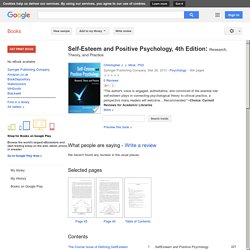
Self-Esteem and Early Learning: Key People from Birth to School - Rosemary Roberts. Focusing on the period from birth to school, this book is about babies' and young children's feelings, their learning; and the ways in which the adults in their lives can support their emotional, social and cognitive development.
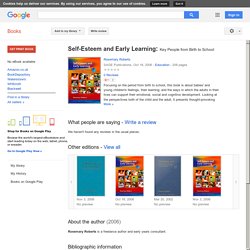
Looking at the perspectives both of the child and the adult, it presents thought-provoking ideas and questions on how adults can make the most of opportunities to support the children with whom they live and work. A story, in episodes embedded throughout the book, makes this an accessible and enjoyable read. Self-esteem - Dictionary Definition. Bridging the Transition from Primary to Secondary School. The transition from primary to secondary school can often be a difficult time for children, and managing the transition smoothly has posed a problem for teachers at both upper primary and lower secondary level.

At a time when 'childhood' recedes and 'adulthood' beckons, the inequalities between individual children can widen, and meeting the needs of all children is a challenge. Bridging the Transition from Primary to Secondary School offers an insight into children's development, building a framework for the creation of appropriate and relevant educational experiences of children between the ages of 10-12. Self-esteem Games for Children - Deborah Plummer. Towards an Understanding of Language Learner Self-Concept - Sarah Mercer.
Introduction to Counseling: Voices from the Field - Jeffrey A. Kottler, David S. Shepard. Jeffrey A.
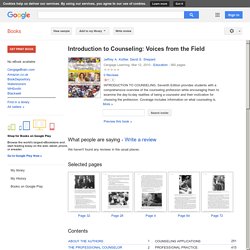
Kottler, Ph.D., is Professor in the Counseling Department at California State University, Fullerton, and one of the foremost authorities and prolific writers in the fields of counseling, psychology, and education. Humanism. Summary: Humanism is a paradigm/philosophy/pedagogical approach that believes learning is viewed as a personal act to fulfil one’s potential.

Key proponents: Abraham Maslow, Carl Rogers, Malcolm Knowles Key terms: self-actualization, teacher as facilitator, affect Humanism. Self-Esteem. What Is Self-Concept & How Does It Form? By Kendra Cherry Updated December 16, 2014. Question: What Is Self-Concept? Answer: Self-concept is the image that we have of ourselves. What Is Self-Esteem? - Definition and Theories. By Kendra Cherry Updated December 17, 2015. We all know that self-esteem can be an important part of success. Too little self-esteem can leave people feeling defeated or depressed. It can also lead people to make bad choices, fall into destructive relationships, or fail to live up to their full potential.
Self-Concept - John Hattie. Xkit undergraduate Sociology.